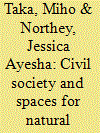|
|
|
Sort Order |
|
|
|
Items / Page
|
|
|
|
|
|
|
| Srl | Item |
| 1 |
ID:
174563


|
|
|
|
|
| Summary/Abstract |
In the Kenyan context of new resource discoveries and an ambitious devolution programme, and what is argued to be a shrinking of civic space globally, the role of civil society organisations (CSOs) working on natural resource governance is critical. The resilience, space and capacity of civil society to engage in the policy process, from community-based organisations to national non-governmental organisations, all shape outcomes in terms of legislation, policy and management of scarce resources. Drawing on interviews with CSOs from across Kenya, following the new 2010 constitution and devolution programme, this article explores how new negotiated spaces of participation around resource governance have emerged in Kenya. Using multidimensional frameworks to analyse power relations, it explores how Kenyan CSOs are cautiously redefining roles, offering expertise when devolved governments struggle, and standing up to powerful interests of corporate lobbies with varying degrees of success.
|
|
|
|
|
|
|
|
|
|
|
|
|
|
|
|
| 2 |
ID:
149600


|
|
|
|
|
| Summary/Abstract |
This paper uses a case study of fisheries co-management in Hawaii to explore barriers to community participation in resource management and the reasons for these impediments. Our study suggests that while fishers may disobey regulations to maximise personal gain, they may also understand the necessity for regulations and desire more stringent enforcement. This seeming paradox reflects the tension between a recognised need to conserve resources through restricting harvests and competitive pressure among individual fishers. When fishers observe insufficient enforcement on the part of government agencies, this may fuel an already present sense of disrespect for and distrust of the government, inhibiting community participation in co-management efforts. This study suggests that rather than attempting to directly encourage community members to participate in co-management efforts, managers should instead focus on enhancing enforcement to alleviate communities' frustration and disrespect. Thus, enhanced enforcement efforts may boost participation in management activities and lead to a more sustainably managed resource.
|
|
|
|
|
|
|
|
|
|
|
|
|
|
|
|
| 3 |
ID:
139007


|
|
|
|
|
| Summary/Abstract |
A burgeoning interest among academics, policy-makers and civil society groups has developed concerning Africa's extractive sector and particularly its mining codes, which are now at the centre of a wider policy debate over natural resource governance and economic development on the continent. This article reviews the evolution of Africa's regulatory codes in the mining sector, which has undergone what Bonnie Campbell describes as ‘three generations’ of liberalization since the 1980s. We also highlight new voluntary, regional and transnational initiatives, driven by a host of heterogeneous actors from Africa and abroad, which constitute a ‘fourth’ generation of mining codes and natural resource governance practices that place primary emphasis on transparency and accountability by both mining companies and host governments. This new generation of natural resource governance initiatives presents new opportunities as well as unique challenges, particularly with the growing role of emerging economies such as the BRICS (Brazil, Russia, India, China and South Africa). We conclude by assessing future trends and policy challenges in Africa's extractive sector governance.
|
|
|
|
|
|
|
|
|
|
|
|
|
|
|
|
| 4 |
ID:
162623


|
|
|
|
|
| Summary/Abstract |
The current configuration of global land politics – who gets what land, how, how much, why and with what implications in urban and rural spaces in the Global South and North – brings disparate social groups, governments and social movements with different sectoral and class interests into the issue of natural resource politics. Governance instruments must be able to capture the ‘political moment’ marked by the increasing intersection of issues and state and social forces that mobilise around these. This paper looks at whether and how the Voluntary Guidelines on Responsible Governance of Tenure of Land, Fisheries and Forests in the Context of National Food Security (also known as the TGs) passed in 2012 in the United Nations Committee for Food Security (CFS) can contribute to democratising resource politics today. This work puts forward some initial ideas about how systematic research into the TGs can be done more meaningfully.
|
|
|
|
|
|
|
|
|
|
|
|
|
|
|
|
|
|
|
|
|